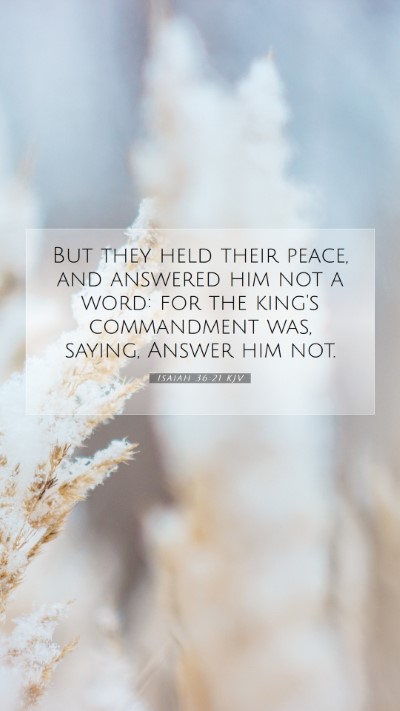Understanding Isaiah 36:21: A Comprehensive Bible Verse Commentary
Isaiah 36:21 provides deep insights into the themes of faith, obedience, and the response of God’s people to external threats. It reads:
"But they held their peace, and answered him not a word: for the king's commandment was, saying, Answer him not."
Summary of Interpretations
This verse occurs during a critical moment in the narrative of the Assyrian siege of Jerusalem. As the Assyrians taunt and threaten the inhabitants, the instructed silence of God’s people carries profound implications.
Key Themes and Analysis
- Obedience to God’s Command: The command not to answer the Assyrian representative speaks to the importance of obedience to God’s will. Commentary by Matthew Henry emphasizes that sometimes, silence reflects trust in God’s power and a refusal to engage in fruitless arguments with opposition.
- The Power of Restraint: Albert Barnes notes the significance of holding one's peace. In times of turmoil, restraint can be an act of faith, demonstrating reliance on God rather than on human reasoning or verbal retorts.
- The Spiritual State of Jerusalem: Adam Clarke suggests that this silence reflects the spiritual condition of the people. They were aware of their inability to defend themselves and knew that their only hope lay in divine intervention.
In-Depth Commentary Analysis
Matthew Henry’s Perspective
Matthew Henry elaborates on the importance of not responding to provocations, citing that the king’s command against speaking serves as a strategy to avoid giving the enemy grounds for boasting or attacking. This silence can be perceived as both a strategic maneuver and an expression of faith.
Albert Barnes’ Insights
Albert Barnes highlights that responding to the Assyrians would have brought about unnecessary conflict. He points out that patience and silence in the face of trials is often recommended in Scripture, where God ultimately fights for His people. The act of silence reflects a profound trust in God’s ability to handle the situation.
Adam Clarke’s Exposition
Adam Clarke reflects on the theological implications of this verse, suggesting that silence can also be a sign of impending divine intervention. The people’s avoidance of engaging with the enemy reflects their deep understanding of their position and vulnerability before God.
Application of Isaiah 36:21
In applying the lessons from Isaiah 36:21, one can draw several key points:
- Faith Under Fire: Like the inhabitants of Jerusalem, believers today can find strength in silence, trusting that God’s plans will unfold according to His wisdom.
- Understanding the Power of Words: In a world filled with conflict and contention, sometimes restraint from words can invoke a greater purpose. Knowing when to engage and when to remain silent is critical in spiritual warfare.
- Reliance on Divine Strength: The narrative reminds believers that ultimate deliverance comes from God alone, reinforcing the principle that He is in control during times of trial.
Cross References
This verse relates to several other scripture passages that reinforce its themes:
- Psalm 46:10: "Be still, and know that I am God."
- Proverbs 17:28: "Even a fool, when he holdeth his peace, is counted wise."
- Isaiah 30:15: "In quietness and in confidence shall be your strength."
Conclusion
The study of Isaiah 36:21 underscores the value of silence and restraint in the face of adversity. It invites readers to reflect on how they respond to challenges and the importance of placing trust in God’s providence. Such insights are invaluable for anyone engaging in Bible study insights or looking for Biblical exegesis. Understanding the meaning of Bible verses within their context is essential for a holistic comprehension of Scripture.


